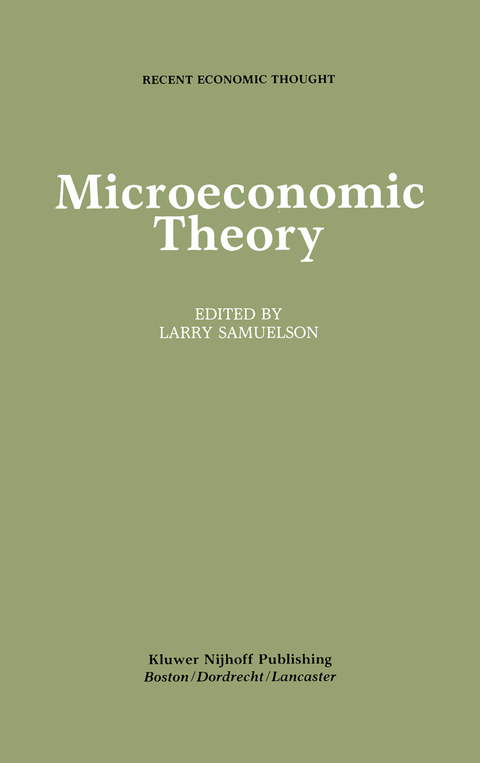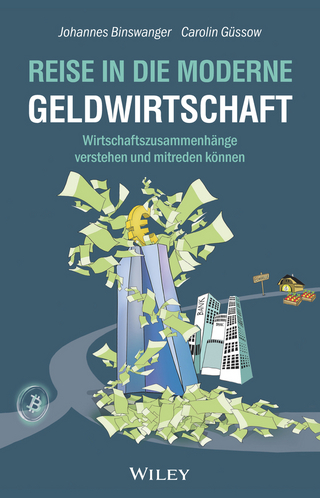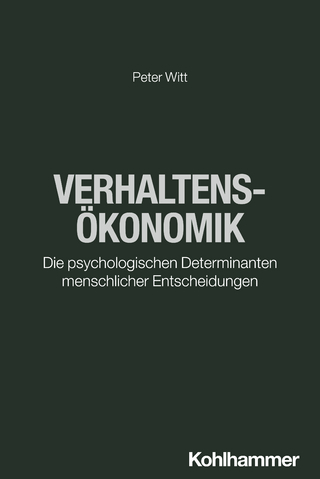
Microeconomic Theory
Seiten
1986
Kluwer Academic Publishers (Verlag)
978-0-89838-170-2 (ISBN)
Kluwer Academic Publishers (Verlag)
978-0-89838-170-2 (ISBN)
It is often said that everyone understands precisely what is meant by the notion of probability-except those who have spent their lives studying the matter. Are random variables simply improperly measured deterministic variables, or inherently random? The same type of difficulty arises when attempting to produce a volume on microeconomic theory.
It is often said that everyone understands precisely what is meant by the notion of probability-except those who have spent their lives studying the matter. Upon close scrutiny, the intuitively obvious idea of probability becomes quite elusive. Is it a subjective or objective concept? Are random variables simply improperly measured deterministic variables, or inherently random? What is meant by the phrase "other things held constant" that often appears in descriptions of probability? These questions involve fundamental philosophical and scientific issues, and promise to elude definitive answers for some time. The same type of difficulty arises when attempting to produce a volume on microeconomic theory. The obvious first question-what is microeconomic theory?--
It is often said that everyone understands precisely what is meant by the notion of probability-except those who have spent their lives studying the matter. Upon close scrutiny, the intuitively obvious idea of probability becomes quite elusive. Is it a subjective or objective concept? Are random variables simply improperly measured deterministic variables, or inherently random? What is meant by the phrase "other things held constant" that often appears in descriptions of probability? These questions involve fundamental philosophical and scientific issues, and promise to elude definitive answers for some time. The same type of difficulty arises when attempting to produce a volume on microeconomic theory. The obvious first question-what is microeconomic theory?--
1 Introduction: An Affirmative View of Microeconomic Theory.- 2 Alternatives to Expected Utility Theory for Risky Decisions.- 3 Consumer Learning and Optimal Pricing Strategies for Products of Unknown Quality.- 4 Rationality and Social Choice.- 5 Resolution of Paradoxes in Social Choice.- 6 The Demand Revealing Mechanism.- 7 The Design of Efficient Resource Allocation Mechanisms.- 8 The Theory of Bargaining.- 9 The Elements of Fixprice Microeconomics.- 10 Possibility Theorems, Incentives, and Progress in Economic Theory.- 11 Institutions as a Solution Concept in a Game Theory Context.- 12 The State of Microeconomics: An Historical Perspective.
| Erscheint lt. Verlag | 31.3.1986 |
|---|---|
| Reihe/Serie | Recent Economic Thought ; 6 |
| Zusatzinfo | XVIII, 278 p. |
| Verlagsort | Dordrecht |
| Sprache | englisch |
| Maße | 155 x 235 mm |
| Themenwelt | Wirtschaft ► Volkswirtschaftslehre ► Mikroökonomie |
| ISBN-10 | 0-89838-170-3 / 0898381703 |
| ISBN-13 | 978-0-89838-170-2 / 9780898381702 |
| Zustand | Neuware |
| Haben Sie eine Frage zum Produkt? |
Mehr entdecken
aus dem Bereich
aus dem Bereich
Wirtschaftszusammenhänge verstehen und mitreden können
Buch | Softcover (2023)
Wiley-VCH (Verlag)
19,99 €
die psychologischen Determinanten menschlicher Entscheidungen
Buch | Softcover (2024)
Kohlhammer (Verlag)
39,00 €


